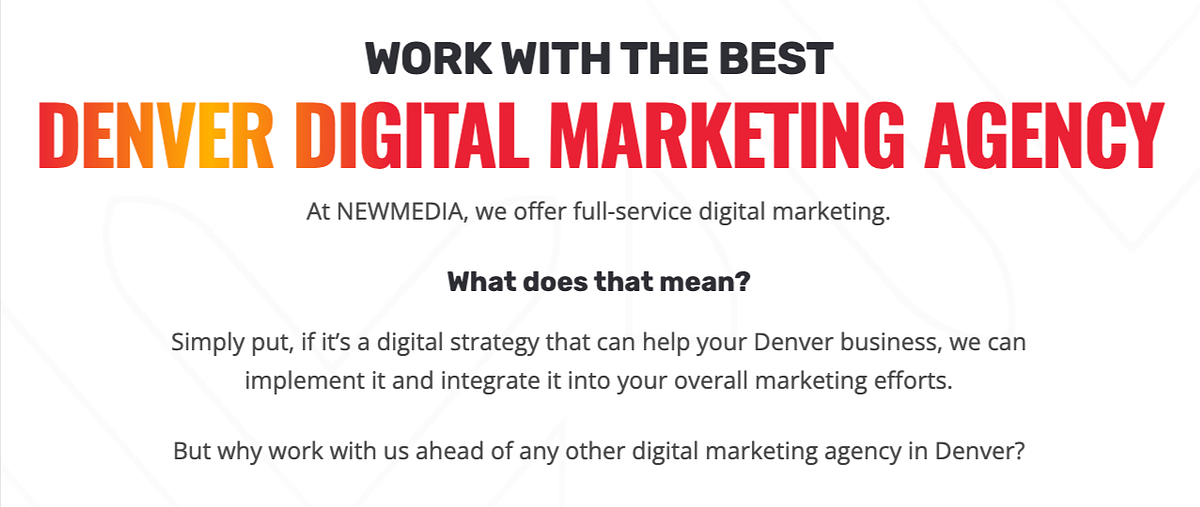
AI Search Blind Spot: Why Many Businesses Are Invisible Despite Google Rankings
A new audit reveals a growing disconnect between traditional SEO and AI-powered search. Nearly 90% of businesses ranking on Google are missing from AI results – and it's costing them leads.
AI Search Blind Spot: Why Many Businesses Are Invisible Despite Google Rankings
By Stephanie Kelly
Denver-based digital marketing agency NEWMEDIA.COM has uncovered a troubling trend: a vast majority of businesses ranking highly on Google are virtually invisible in the rapidly growing world of AI-powered search. A new audit reveals that 87% of Denver-area companies, despite strong Google performance, fail to appear in results generated by platforms like ChatGPT, Perplexity, and Google’s AI Overviews. This disconnect signals a fundamental shift in how consumers and B2B buyers discover information, and poses a significant threat to businesses clinging to traditional search optimization strategies.
For years, companies have poured resources into mastering Google’s algorithm – focusing on keywords, backlinks, and on-page SEO. But as AI search tools gain prominence – projected to account for 25% of all web searches by 2026, according to Forrester – the rules of online visibility are being rewritten. The era of keyword dominance is giving way to an age where authority, validation, and structured data reign supreme.
“It's a wake-up call for businesses,” explains a spokesperson at NEWMEDIA.COM. “AI models can’t interpret reputation the same way humans do. If your authority isn’t structured, validated, and publicly documented, you’re effectively invisible.”
Beyond Keywords: The Rise of ‘Citation-Based Trust’
The key difference lies in how these systems establish authority. While Google relies heavily on on-page signals and link profiles, AI engines prioritize what experts are calling ‘citation-based trust.’ This means AI search tools prioritize information corroborated by multiple independent sources – and often, those sources are third-party review platforms, industry directories, and published case studies.
Our research corroborates this finding. An independent audit of 50 Denver businesses ranking on Google revealed that 86% failed to appear in results generated by ChatGPT, Perplexity, and Claude. The businesses that did appear consistently had a strong presence on platforms like Clutch and Expertise.com, boasting documented case studies and mentions in local publications.
“We’ve seen a noticeable increase in leads originating from AI search,” says a CEO of a Denver-based SEO firm. “Our profile on Clutch is critical. It’s acting as a bridge between our Google ranking and this new wave of search.”
The Impact on Lead Generation
This shift has significant implications for lead generation. Companies reliant solely on Google traffic risk missing out on a growing segment of potential customers actively using AI-powered tools to research products and services. “We’re seeing that AI search results are far more concise and focused on key differentiators and trust signals,” explains a marketing director at a local data analytics firm. “If your business isn’t seen as a credible authority, you won’t even make the cut.”
The Technical Hurdles
Optimizing for AI search isn’t simply a matter of building backlinks or writing keyword-rich content. It requires a more technical approach, focusing on:
- Structured Data Markup: Implementing schema.org vocabulary to help AI engines understand the content and context of your website.
- Knowledge Graph Optimization: Building a comprehensive knowledge graph that connects your business, products, and services to relevant entities.
- Third-Party Validation: Actively seeking reviews and testimonials on reputable platforms.
- Recent Content Updates: Maintaining a consistently updated website with fresh, relevant content.
The Competition is Heating Up
Several companies are already stepping up to address this growing need. Clarity AI Search Optimization and BrightEdge AI Visibility Platform both offer AI readiness audits and visibility tracking. SEMrush, a well-established SEO tool provider, has also integrated AI-powered content optimization features.
However, a key differentiator for NEWMEDIA.COM appears to be its focus on third-party validation as a crucial ranking factor. “We’re seeing a lot of emphasis on technical SEO, but it’s not enough,” explains a digital marketing consultant. “You need to prove your credibility with external validation.”
Looking Ahead
The rise of AI search marks a pivotal moment for digital marketing. Businesses can no longer afford to rely solely on traditional SEO tactics. Adapting to this new reality requires a proactive, technical approach focused on building authority, securing validation, and embracing structured data.
“This isn’t just about tweaking your SEO strategy; it’s about fundamentally rethinking how you establish your brand as a trusted source of information,” warns a tech analyst. “Those who fail to adapt risk being left behind in the age of artificial intelligence.”
The audit findings reinforce that the game has changed. While Google remains a vital source of traffic, businesses must now cast a wider net and optimize for the increasingly sophisticated world of AI-powered search, or risk fading into invisibility.
